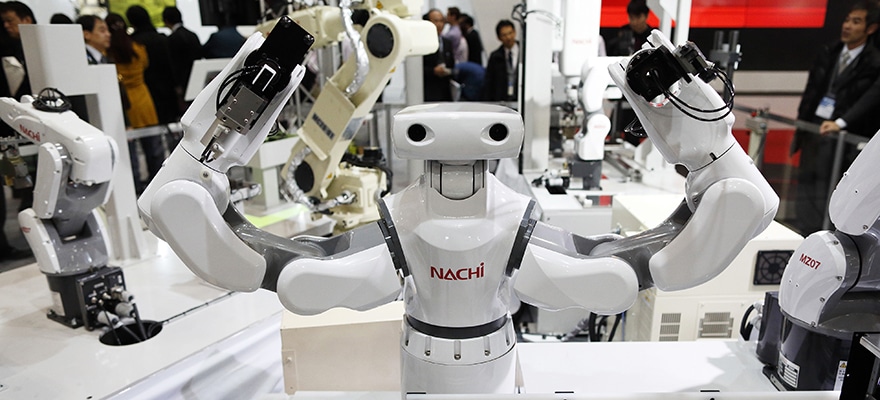This article was written by Charlie Trumpess who is a marketing consultant and freelance copywriter.
Bots are everywhere nowadays, even if you don’t realise it.
They’re the clever little software programs that automatically respond to our requests and queries. When you ask Siri or Google Now a question it’s a bot that answers. A new generation of artificial intelligence, text-based chatbots are now being embedded with Facebook Messenger, Skype and Slack, for example.
As these bots become more sophisticated they will change the way we all use mobile devices and the internet. Bots have the potential to replace or augment many of the steps on the path to purchases. Instead of browsing the internet, visiting websites, using social platforms and mobile apps, bots will assume the responsibility for searching and finding what we need. It’s an exciting, brave, risky new world.
Robot Traders
Retail FX automated trading systems have been around for a while. There are numerous easily programmed FX robots that will execute specific trading stratagems. While the robot trader performs its tasks with speed and efficiency, it is also restricted by its programming. It will only execute a trade when all criteria are met. Unfortunately, the short history of automated trading hasn’t been a very auspicious one. Many trading bots have failed to perform for a variety of reasons.
Some bots perform well when executing trades in demo environments that condense years of historic data only to fail the short term, get rich quick desires of their day trading masters. Other bots have simply been designed to scam the unwary trader. Of course, day traders must take some responsibility for their automated trading failures. Many traders have unrealistic expectations. They choose to ignore the high risk nature of many financial instruments.
Rogue Algorithm
The dangers of institutional, automated, high speed, high frequency trading have been endlessly debated and are well documented. High frequency trading has resulted in flash crashes of the market and greater systemic risks. In 2012 things went spectacularly wrong with Knight Capital’s (now KCG Holding) high frequency trading algorithm costing the firm $460 million in just 45 minutes. The firm’s stock price collapsed. The bot disrupted the prices of another 148 companies listed on the New York Stock Exchange (NYSE).
The Evil Bots Do
Bots are responsible for about half the internet’s web traffic. There are good bots and bad bots. Goods bots are out there performing legitimate tasks like data collection for search engines and e-commerce sites. The bad bots are running around generating spam, launching denial of service attacks (DOS), spying on us, hacking bank accounts and generally being a pain in the arse. Ever wonder why you can never get tickets to the big game or music festival? It’s because scalpers use bots to buy up thousands of tickets within seconds of them going on sale.
Facebook Messenger Chatbots
Since April 2016, the Facebook Messenger app has been open to the development of a new generation of chatbots. Facebook Messenger provides open APIs to create natural language bots for marketing, sales, search, customer services and support purposes. Today around 11,000 chatbots have been created and that number grows every day. So why should an FX brokerage or any other organisation think about building a Facebook chatbot? Well, 60 million messages are sent through WhatsApp and Facebook Messenger daily. That’s triple the volume of SMS texts per day. Currently Facebook Messenger has 1 billion monthly active users and there are 50 million companies with a presence on the Facebook platform.
Brands and People
Chatbots represents a great opportunity to establish real-time connections between brands and people. American Express has a chatbot in beta testing that will track card members’ transactions and offer complementary content and benefits. You purchase airline tickets to Paris on your Amex card, for example, and the chatbot suggests accommodation, restaurants, shops and places of interest for you to visit. You can already find chatbots from consumer brands like Pizza Hut, Whole Foods and Burger King.
Bots have the potential to streamline all our working lives, giving us more time to concentrate on high value business activities. Bots can perform lots of mundane tasks such as receiving an invite to a trade show, checking its relevance to your role, reviewing your calendar and availability, confirming your attendance, organising your travel and accommodation, and notifying you accordingly.
Bringing the Day Trader Closer
FX brokerages face two big challenges: how to on-board new traders and how to retain their loyalty. Chatbots have the ability to collect data on prospective traders and use that information to engage with them in a humanistic way. Having helped on-board new day traders, a chatbot can be integrated with a brokerage’s CRM and back office systems to bring the customer closer, incentivise and reward them better. AJ Bell’s Youinvest bot allows investors to open charts, place orders and review trades from within Facebook Messenger, for example.
Although the bot revolution has been something of a slow burn, they now appear to be coming into their own for marketing and sales purposes. Certainly some of the hype will prove to be just that and perhaps bots will evolve in new and different directions from those anticipated. However, you can be assured that the robots never sleep. They are always on the clock, constantly collect customer data, communicate naturally, connect with multiple platforms, streamline tasks, and offer new customer experiences.


















